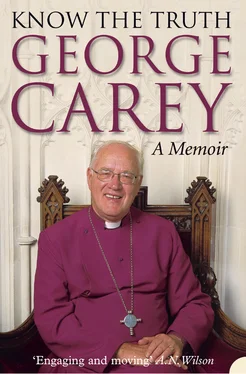1 ...6 7 8 10 11 12 ...29 Although I was glad when the square-bashing was over, I have to admit that it taught me a lot about myself and how to cope when pushed to one’s limit. At the end of the eight weeks I was posted to RAF Compton Bassett in Wiltshire to train as a Wireless Operator. If I was not able to be a Wireless Officer in the Royal Navy, well, being a Wireless Operator in the Royal Air Force seemed an interesting challenge. And so it turned out to be. The training took twenty weeks, and included elementary electronics as well as having Morse code so drummed into us that by the end of it most of us were able to send and receive Morse at over twenty words a minute. As VHF was still in its infancy even in the RAF at that time Morse code was a reliable and efficient form of communication, though of course very slow.
At Compton Bassett we were able to participate in many activities, ranging from sport to hobbies of all kinds. Discipline continued to be very strict, but we were now finding that the ordered life enabled work and leisure to function smoothly. I played a lot of football, and enjoyed running as well. At weekends evening worship at Calne Parish Church was certainly far more authentic than the formal and compulsory church parades.
At the end of the training, everyone waited with impatience for their postings. I was astonished to be selected for the post of Wireless Operator on an air-sea rescue MTB (motor torpedo boat) operating out of Newquay in Devon. It seemed that at last my dreams would be fulfilled. If not the Royal Navy, at least I would be at sea with the RAF. But it was not to be. Two days before taking up my posting I was told to report to the CO’s office, where I was given completely different instructions – to go home on leave immediately, and to report to Stansted airport the following Sunday evening for an unknown destination.
I was among twenty or so extremely puzzled airmen on a York aircraft which left Stansted that September Sunday evening in 1955. To the question I put to the Sergeant on duty I received the friendly rejoinder, ‘You’ll know soon enough where you are when you land, laddie.’
Sure enough, I did. The following morning I found myself in Egypt, and the same day I started work as a Wireless Operator (WOP) at RAF Fayid – a huge RAF camp alongside part of the Suez Canal known as the ‘Bitter Lakes’. With a large group of other WOPs work began in earnest, handling signals from Britain and the many RAF bases in the Middle East. In my leisure time I enjoyed exploring beyond the base and discovered many things about Egypt, its culture and life. I settled down to church life on the base, and made many friends.
After three months at RAF Fayid I was sent to RAF Shaibah – a posting which was greeted by howls of sympathy by my colleagues. Shaibah was a tiny base about fifteen miles from Basra, at the top of the Persian Gulf. It is very hot most of the year, and the temperature rarely falls below 120 degrees in the shade in summer. With just 120 airmen to service the squadron of Sabre jets and cover the region I was told that it was a deadly appointment, and that I was to be pitied.
On the way to Shaibah a bizarre incident took place that was to make me chuckle often in later life. The journey began with a flight to Habbaniyah, a large RAF camp close to Baghdad, from where I was to make my way by train to Basra. I boarded the plane and was shown to my seat by the WOP, who told me, ‘Carey, your lunch is on your seat. Make yourself at home,’ before disappearing into the cockpit alongside the pilot. There were no other passengers, but I noticed that there was another lunchbag on the seat alongside mine. Surely this was for me too, I concluded. It was, I admit, naïve of me to suppose that the RAF would offer me two lunches and without hesitation I scoffed both of them. To my surprise the plane landed in the Transjordan, and as we taxied towards the concourse the terrible truth dawned on me – we were about to pick up another passenger, and I had eaten his lunch.
The passenger in question was an elderly clergyman, who was greeted with deference by the crew and shown to his seat alongside mine. We had a brief chat, and the plane took off. The moment came when he reached for his lunchbox, and I had to stammer out an apology for having eaten his lunch. He made light of it, and we relaxed into a pleasant conversation in which he showed great interest in my welfare and future. On landing at Habbaniyah I was impressed to see a red carpet laid out to welcome somebody – I knew it was not for me. The top brass were all there alongside the CO. The elderly clergyman paused to say goodbye to me, then turned to the steps to be greeted by the CO and whisked away.
‘Who was that?’ I asked the WOP.
‘Oh, that’s Archbishop McInnes, Archbishop of Jerusalem and the Middle East,’ came the reply.
Sadly, I never had an opportunity to apologise again to Archbishop George McInnes for having eaten his lunch that day; but at least I was later able to tell his son, Canon David McInnes, of the incident. David had followed his father into the Church, and completed a very distinguished ministry as Rector of St Aldate’s, Oxford. He was sure that his father would have been delighted and thoroughly amused that the culprit was a future Archbishop of Canterbury.
Despite the warnings of my colleagues at Fayid, Shaibah was to prove a wonderful posting for me. I was one of eight WOPs who had a special role as High Frequency Direction Finding Radio Operators (known as HF/DF Operators). So primitive and sensitive was this means of communication that it required the erection of special radio huts three miles from the camp, out in the desert. On each side of the hut stood four large aerials which received signals from transport planes, and which provided an accurate beam by which a plane could determine its position and find its way to us.
Operators were on duty in these isolated huts for eight hours at a time, and for many months we worked around the clock. The duty was often boring, very hot and lonely. There were however times when the importance of our work was driven home. On one occasion several Secret Service personnel called on me to help trace the position of a Russian radio network which was proving to be a nuisance to the RAF. Another time, a two-engine transport plane from Aden to Bahrain was in serious trouble, with one engine on fire and the other causing problems. To this day I recall the SOS ringing through my headphones, and the signal telling me that the plane needed help urgently as it was about to crash. All the training I had received was focused at that very moment on giving the crew directions on how to find their way to Shaibah, then alerting the main camp and the emergency services that a crippled plane was in need of help. As a member of the air-ground rescue team I would be required to switch instantly to new responsibilities if the plane crashed in the desert. Fortunately I was able to help nurse the plane to the base, where it made an emergency landing and all was well.
It was a lonely job most of the time, but I loved it. It gave me time to read and reflect. When things were quiet and no planes were within a two-hundred-mile radius it was safe to walk a short way from the hut and explore the desert. The idea that the desert was void of life, I discovered, is quite erroneous. There were always fragile, tiny yet beautiful flowers that one could find, and the place teemed with insects, snakes and scorpions. As for human contact, I often met passing Bedouin tribespeople: sometimes shy, giggling young girls hidden behind their flowing black robes, herding their black goats; sometimes their more confident brothers and fathers. They were always friendly, even though we could only communicate through signs and through my limited Arabic, which caused great merriment. In exchange for water, which I had in abundance, I would often receive figs, dates and other fruits. Their simple, uncomplicated lives seemed attractive and natural. It was always a joy to meet them, and for a few moments share a common humanity in a hostile terrain.
Читать дальше












